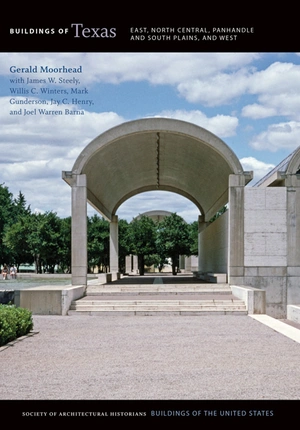
Built into the limestone banks of Turtle Creek, the outward stepping layers of one of Wright’s last built works rise out of the woods along the creek, a shorter, linear version of the curvaceous Guggenheim Museum in New York City, then underway. A vertical concrete drum complements the strong horizontals. The project was commissioned by the Dallas Theater Center and named after a deceased actress in the company. Wright created a thrust-stage space (without proscenium), but poor sight lines, lighting, and other planning problems caused a major interior remodeling in 1984 that removed most of Wright’s original interior, furnishings, and finishes. Expanded drives and parking lots have isolated the building from its site and the creek. The Dallas Theater Center moved to the Arts District in 2008 (DS39), and this theater is now used intermittently by local performing arts groups.

